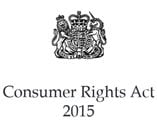The Law Clerk Writes…. “With my law degree out of the way, I do some work as a Litigation Assistant and I am also involved in my own long running Small Claims case. The Law fascinates me and it concerns me how disconnected most people are from it so part of my goal is to try and explain how it works to ‘ordinary’ people like online sellers”.
Today the Law Clerk looks at the Consumer Rights Act 2015:
The Consumer Rights Act 2015
English Law is primarily incremental and The Consumer Rights Act 2015 is a good example.
While it is a ‘new’ Act of Parliament, quite a bit of the content is not new so the Act is more of a consolidation and much that went before still holds true.
If, for example, a claim arises under The Consumer Rights Act 2015 Section 11, the courts are certain to look to the case law that has flowed from Section 13 of the Sale of Goods Act 1979 & 1893.
Also as before, people will not appreciate the definitions of ‘consumer’ and ‘trader’.
If I, as a business in construction, buy tea bags for the office, even if in the company name, I am a consumer as I am “acting for purposes that are wholly or mainly outside that individual’s trade” as I am not in the tea or tea bag trade.
If I buy those tea bags from online seller TeaBagCity who have been trading in tea bags for years, then they are a trader regardless of whether they are a business, a student, a granny working from home or whatever as they are “a person acting for purposes relating to that person’s trade”.
And what if both parties are consumers or both are traders (if that is even possible now)?
This new Act only applies to contracts (written or otherwise) for supply by a trader to a consumer and otherwise it is back to the Sale of Goods Act 1979.
Until some claims percolate to the appeal level, we are unlikely to get any reported cases which might clarify the court’s thinking on all this.
What, for example, will they make of the use of the word ‘person’ in the definition of trader but ‘individual’ in the definition of consumer? What is the difference?







2 Responses
the law states you cant exceed 70 mph on any UK public highway road anywhere?
so law and actuality is vastly different
The law defines the boundaries of what society will and will not accept and you make a valid point that it only becomes an issue if a person is called to account.
In the case of offences under the Road Traffic Offenders Act 1988, including speeding, the offence is criminal and the State brings the case, whereas breach of the Consumer Rights Act 2015 is a civil matter where one person sues another.
The police, CPS and criminal justice in general is spread rather thinly making detection and prosecution subject to allocation of scarce resources where as a single aggrieved trader or consumer can be a highly motivated litigant.